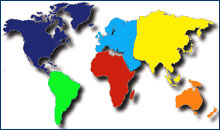Pagan feasts & Ecclesiastical keggers
Europe's biggest holidays & festivals
Perhaps the harvest has come in, or the local saint's day has rolled around. Maybe all the regional orchestras are in town for one week, or boar-hunting season needs to be inaugurated. Or sometimes just because it's the second Tuesday in May again, Europeans will throw a festival.
Arrive during one, and you'll encounter flower-strewn streets, military and religious processions, moonlit concerts in ancient theaters, mass blessings of sheep, jazz or Celtic music jams, violent Renaissance soccer, or raging bonfires in public squares. People dance in the plaza; fountains spew wine; locals joust in medieval garb; and horses race through the streets. You never know what you'll be in for, but it's bound to be memorable.
I often plan entire vacations around a single big festival. This is a time for celebrating, not sightseeing. All of the city's traditional sights may be closed (especially in smaller towns), but a visit is well worth it because it can become the most memorable time of your trip—a privileged glimpse into a slice of European life most tourists never get to witness. It's your chance to party down with the locals, fill a half dozen of your camera's memory chips, and take away some unforgettable memories.
On most state and religious holidays throughout Europe, you'll find most everything closed or on reduced time schedules: sights, shops, banks, tourist and government offices, train and bus routes, and so on. Hotels and restaurants are either filled with revelers or closed for vacation. City public transportation may be cut back, but it is usually running.
As in the United States, Christmas and New Year's Day in Europe, and to some extent the days in between, take on a holiday spirit and schedule. Most of Europe also takes off on Easter, May 1, and August 15. Europeans tend to celebrate more holidays on the church calendar than the United States does, especially in Catholic countries such as Italy, Spain, and, to a lesser extent, France.
If you plan to be in town anywhere near a major festival or other cultural event, book your hotel rooms as soon as possible. Things fill up quickly at festival time, sometimes months in advance. For some of the big festivals in smaller places, such as the Palio in Siena, Italy, all the hotels within the town walls may be sold out over a year beforehand. Book a room in a neighboring town instead.
The next page contains a highly subjective list of the top 10 festivals in Europe. Contact the local tourist offices for more information or specific dates.
Finding festivals in Europe
What's On When (www.whatsonwhen.com) - The premier resource on events around the globe, detailing everything—whether annual occurrences or one-time events—from cultural festivals to concerts, massive parties to major trade shows, upcoming exhibitions to top nightlife options. An utterly fantastic Website you should consult before traveling anywhere so you can help plan when to be in town (to help celebrate a pagan folk fest), and when to stay away (when some major annual convention is going to book the hotels solid).
Tourist Offices - The best resource for local events and festivals is the local tourism office; you can find direct links to them here.
Wild Planet by Tom Clynes - A bit out of date (pub 1995), but still an excellent guidebook to festivals around the world by a quite excellent travel writer (Sorry; it's available in print form only, so you'll have to order it from Amazon.)
Related Articles |
Outside Resources |
This article was last updated in August 2007. All information was accurate at the time.
Copyright © 1998–2010 by Reid Bramblett. Author: Reid Bramblett.



 ShareThis
ShareThis

